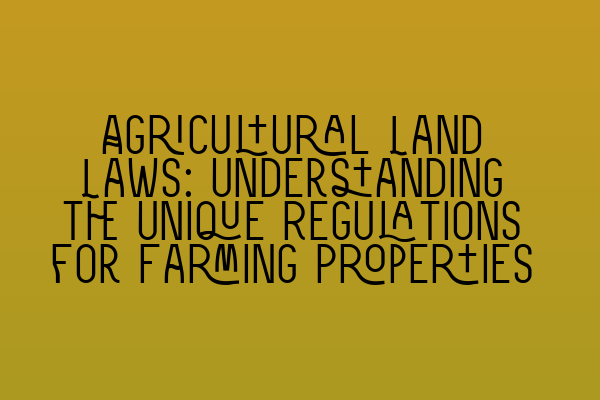At SQE Property Law & Land Law, we understand the complexity and unique regulations involved in agricultural land laws. Whether you are a farmer looking to purchase or sell farmland, a landowner who wants to lease their agricultural property, or a solicitor assisting clients with agricultural land transactions, it is essential to have a strong understanding of these specific laws and how they impact the farming community.
In this comprehensive blog post, we will delve into the various aspects of agricultural land laws in the UK, shedding light on key regulations, legal challenges, and important considerations that can arise in farming property transactions. We will explore topics such as ownership, transfers, leasing, and planning permissions. So let’s jump right in!
The Importance of Agricultural Land Laws
Agricultural land laws are crucial for ensuring sustainable and effective management of farmland. These laws aim to protect the interests of both landowners and farmers, fostering a harmonious relationship and supporting the agricultural sector’s growth and development. By having clear regulations in place, it becomes easier to navigate complex land transactions and resolve any disputes that may arise.
Understanding these laws is vital for anyone involved in agricultural property transactions, as it ensures compliance with legal requirements and prevents any potential legal issues in the future. By keeping up-to-date with the latest updates and being aware of common pitfalls, you can offer expert advice and representation to clients, ensuring their transaction goes smoothly.
Now, let’s explore some relevant agricultural land laws that govern farming properties in the UK.
1. Ownership and Transfers
When it comes to owning and transferring agricultural land, there are several legal considerations to keep in mind. Agricultural land is subject to specific regulations that differ from those applicable to residential or commercial properties.
One key aspect is the requirement for a person or entity to have the “right to occupy” the land to qualify as an agricultural tenant. This right can be obtained through different means, such as an agricultural tenancy agreement.
For land transfers, it’s important to conduct thorough due diligence to ensure that the property’s legal status is clear. This includes checking for any potential restrictions, encumbrances, or easements that might impact the use or ownership of the land.
If you are interested in updates on UK property laws and their key changes and implications, check out our related article here.
2. Agricultural Leases and Tenancies
Leasing agricultural land is a common practice that allows landowners to generate income while ensuring the land remains in agricultural use. However, agricultural leases come with their own set of regulations, rights, and responsibilities.
An agricultural lease usually grants the tenant exclusive possession and use of the land for agricultural purposes. The terms and conditions of the lease must be carefully negotiated and documented to protect the interests of both the landlord and the tenant. It is crucial to review the lease agreement thoroughly and understand the rights and obligations of each party involved.
Additionally, navigating the lease laws in the UK is vital for tenants and landlords. For essential guidelines in this regard, check out our related article here.
3. Planning Permissions and Development
Obtaining planning permissions for agricultural land can be a complex process due to strict regulations aimed at safeguarding the rural environment and minimizing the impact of development on farmland. Planning permission is required for significant changes in land use, construction of new buildings, or any other development activities.
Working closely with local planning authorities, solicitors play a vital role in guiding landowners and farmers through the planning application process, ensuring compliance with all necessary regulations and minimizing the risk of delays or rejections.
4. Legal Challenges and Common Pitfalls
Like any area of law, agricultural land laws come with their own set of potential challenges and pitfalls. One common issue is boundary disputes, where neighboring landowners may disagree on the exact boundaries of their properties.
When faced with a legal challenge in agricultural land transactions, seeking expert advice is crucial to ensure a favorable resolution. Our comprehensive guide on legal challenges in property transactions provides valuable insights into navigating such situations. You can find it here.
5. Exam Preparation and Revision Tips
For aspiring solicitors or law students studying land law, having a solid understanding of agricultural land laws is essential for success. Land law exams often include questions related to agricultural properties, so it’s crucial to be well-prepared.
If you are looking for land law revision tips and strategies to ace your exam preparation, make sure to check out our related article here.
Conclusion
Agricultural land laws play a vital role in protecting the rights of landowners and farmers while ensuring the sustainable and efficient management of farmland. Whether you are a farmer, landowner or solicitor, having a strong understanding of these laws is crucial to successfully navigate agricultural property transactions.
At SQE Property Law & Land Law, we have a team of experienced solicitors who specialize in agricultural land laws. We provide expert advice and assistance to clients, helping them navigate the complex legal landscape and achieve their goals.
If you have any questions or need assistance with an agricultural land transaction, don’t hesitate to get in touch with us. Our team is ready to assist you.
